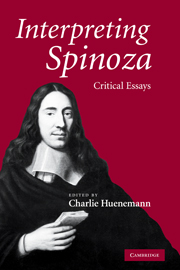Book contents
- Frontmatter
- Contents
- Notes on contributors
- Method of citation
- Introduction
- Chapter 1 Representation and consciousness in Spinoza's naturalistic theory of the imagination
- Chapter 2 Rationalism run amok: representation and the reality of emotions in Spinoza
- Chapter 3 “Whatever is, is in God”: substance and things in Spinoza's metaphysics
- Chapter 4 Necessitarianism in Spinoza and Leibniz
- Chapter 5 Epistemic autonomy in Spinoza
- Chapter 6 Spinoza and the philosophy of history
- Chapter 7 Democracy and the good life in Spinoza's philosophy
- Chapter 8 Spinoza's unstable politics of freedom
- Chapter 9 Should Spinoza have published his philosophy?
- Bibliography
- Index
Chapter 3 - “Whatever is, is in God”: substance and things in Spinoza's metaphysics
Published online by Cambridge University Press: 22 September 2009
- Frontmatter
- Contents
- Notes on contributors
- Method of citation
- Introduction
- Chapter 1 Representation and consciousness in Spinoza's naturalistic theory of the imagination
- Chapter 2 Rationalism run amok: representation and the reality of emotions in Spinoza
- Chapter 3 “Whatever is, is in God”: substance and things in Spinoza's metaphysics
- Chapter 4 Necessitarianism in Spinoza and Leibniz
- Chapter 5 Epistemic autonomy in Spinoza
- Chapter 6 Spinoza and the philosophy of history
- Chapter 7 Democracy and the good life in Spinoza's philosophy
- Chapter 8 Spinoza's unstable politics of freedom
- Chapter 9 Should Spinoza have published his philosophy?
- Bibliography
- Index
Summary
Edwin Curley has accomplished something that most scholars in the history of philosophy can only dream of: to come up with an interpretation of a philosopher's thought that is remarkably bold and original and yet, at the same time, so effective and natural that it sometimes simply gets taken for granted. Indeed, it can be said that Curley's insightful and persuasive interpretation of Spinoza's metaphysics, and especially his nomological account of the nature of and relationship between substance and modes, has, in effect, achieved the status of a standard reading.
And yet, although I am proud to call myself a admirer of Curley's reading, I still have some misgivings, and I feel that it may not in fact do sufficient justice to what Spinoza was trying to say. In this essay, I consider what I think are some serious problems facing Curley's account. As Curley himself was the first to admit, there are important questions his interpretation leaves unanswered and objections with which it must deal. Some of these he explicitly raises and addresses. I shall leave these aside, however, and discuss other problems that he seems not to have considered. I will focus on the issue of the relationship between substance and mode in Spinoza's metaphysics and the way in which all things are supposed to be related to (or “in”) God.
- Type
- Chapter
- Information
- Interpreting SpinozaCritical Essays, pp. 53 - 70Publisher: Cambridge University PressPrint publication year: 2008
- 9
- Cited by



